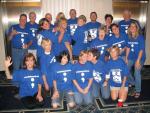The Cancer Survivors Network (CSN) is a peer support community for cancer patients, survivors, caregivers, families, and friends! CSN is a safe place to connect with others who share your interests and experiences.
Canadians help find colon cancer gene mutation

Lisa Rose
CSN Member Posts: 598 Member
Canadians help find colon cancer gene mutation
Updated Sun. Jul. 8 2007 1:39 PM ET
CTV.ca News Staff
Canadian researchers are announcing a new genetic find that may help them in the hunt for early signs of colon cancer.
Researchers at the Ontario Institute for Cancer Research, Cancer Care Ontario and Genome Quebec joined scientists in Europe and the U.S., analyzing DNA from over 10,000 people, including 2,400 Ontarians.
They found that part of chromosome 8, a region of the genome recently linked to breast and prostate cancer, also seems linked to colorectal cancer in a surprising large number of people.
Although a few relatively rare genetic mutations associated with colorectal cancer have been identified, this is the first evidence of a common genetic risk factor.
The findings are published in studies this week in Nature Genetics.
Colorectal cancer is the second leading cause of cancer death in Canada and the leading cause of cancer death among non-smokers. Some 20,000 Canadians will be diagnosed with colorectal cancer this year and 8,700 will die of it. That's some 400 Canadians diagnosed every week.
Caught early, it can be treated and cured. But most cases are found too late, when the cancer has spread and is usually fatal.
Sandi Pniavskas knows colon cancer can kill. The disease took her great-grandmother and her sister, Linda. Sandi wonders if she carries the family risk somewhere in her DNA.
"It is important to me because none of us want to see any more deaths to colorectal cancer," she told CTV News.
While many cases of colon cancer are triggered by lack of exercise and poor diet, it's estimated that 15 to 20 per cent of cases are associated with a familial link. Those, like Sandi, who seem to have a genetic link, are encouraged by the finding.
"When I saw the study and the link to chromosome 8 it was exciting to me because. I wondered if it was me. I wondered the implications for the family."
Identifying a genetic mutation may tell doctors if someone has higher risk of developing colorectal cancer.
"It's very exciting to us because this is what we've been looking for," says Dr. Tom Hudson of the Ontario Institute for Cancer Research.
"This is the first gene that affects a large population. About 30 to 40 per cent of the population carries this risk factor," says Hudson who notes that the gene mutation appears to increase a person's risk of colon cancer by about 20 per cent.
The scientists suspect other genes are involved in the disease but they are calling this their first genetic predictor in a decade.
"It is the largest preventable disease particularly if we can pick it up at an early stage and that is the great promise here," says Dr. Terry Sullivan of Cancer Care Ontario.
Scientists hope to one day turn this finding into a blood test.
"Our goal is to keep on sifting through the genome to find the dozen or so of these risk factors that we believe are important and then use them as a predictive tool to find out who is at risk for colon cancer and who should be screened early for the disease," says Hudson.
With a report from CTV medical correspondent Avis Favaro and producer Elizabeth St. Philip
Updated Sun. Jul. 8 2007 1:39 PM ET
CTV.ca News Staff
Canadian researchers are announcing a new genetic find that may help them in the hunt for early signs of colon cancer.
Researchers at the Ontario Institute for Cancer Research, Cancer Care Ontario and Genome Quebec joined scientists in Europe and the U.S., analyzing DNA from over 10,000 people, including 2,400 Ontarians.
They found that part of chromosome 8, a region of the genome recently linked to breast and prostate cancer, also seems linked to colorectal cancer in a surprising large number of people.
Although a few relatively rare genetic mutations associated with colorectal cancer have been identified, this is the first evidence of a common genetic risk factor.
The findings are published in studies this week in Nature Genetics.
Colorectal cancer is the second leading cause of cancer death in Canada and the leading cause of cancer death among non-smokers. Some 20,000 Canadians will be diagnosed with colorectal cancer this year and 8,700 will die of it. That's some 400 Canadians diagnosed every week.
Caught early, it can be treated and cured. But most cases are found too late, when the cancer has spread and is usually fatal.
Sandi Pniavskas knows colon cancer can kill. The disease took her great-grandmother and her sister, Linda. Sandi wonders if she carries the family risk somewhere in her DNA.
"It is important to me because none of us want to see any more deaths to colorectal cancer," she told CTV News.
While many cases of colon cancer are triggered by lack of exercise and poor diet, it's estimated that 15 to 20 per cent of cases are associated with a familial link. Those, like Sandi, who seem to have a genetic link, are encouraged by the finding.
"When I saw the study and the link to chromosome 8 it was exciting to me because. I wondered if it was me. I wondered the implications for the family."
Identifying a genetic mutation may tell doctors if someone has higher risk of developing colorectal cancer.
"It's very exciting to us because this is what we've been looking for," says Dr. Tom Hudson of the Ontario Institute for Cancer Research.
"This is the first gene that affects a large population. About 30 to 40 per cent of the population carries this risk factor," says Hudson who notes that the gene mutation appears to increase a person's risk of colon cancer by about 20 per cent.
The scientists suspect other genes are involved in the disease but they are calling this their first genetic predictor in a decade.
"It is the largest preventable disease particularly if we can pick it up at an early stage and that is the great promise here," says Dr. Terry Sullivan of Cancer Care Ontario.
Scientists hope to one day turn this finding into a blood test.
"Our goal is to keep on sifting through the genome to find the dozen or so of these risk factors that we believe are important and then use them as a predictive tool to find out who is at risk for colon cancer and who should be screened early for the disease," says Hudson.
With a report from CTV medical correspondent Avis Favaro and producer Elizabeth St. Philip
Comments
Discussion Boards
- All Discussion Boards
- 6 Cancer Survivors Network Information
- 6 Welcome to CSN
- 122.6K Cancer specific
- 2.8K Anal Cancer
- 457 Bladder Cancer
- 312 Bone Cancers
- 1.7K Brain Cancer
- 28.6K Breast Cancer
- 407 Childhood Cancers
- 28K Colorectal Cancer
- 4.6K Esophageal Cancer
- 1.2K Gynecological Cancers (other than ovarian and uterine)
- 13.1K Head and Neck Cancer
- 6.4K Kidney Cancer
- 684 Leukemia
- 804 Liver Cancer
- 4.2K Lung Cancer
- 5.1K Lymphoma (Hodgkin and Non-Hodgkin)
- 242 Multiple Myeloma
- 7.2K Ovarian Cancer
- 70 Pancreatic Cancer
- 493 Peritoneal Cancer
- 5.7K Prostate Cancer
- 1.2K Rare and Other Cancers
- 544 Sarcoma
- 744 Skin Cancer
- 661 Stomach Cancer
- 193 Testicular Cancer
- 1.5K Thyroid Cancer
- 5.9K Uterine/Endometrial Cancer
- 6.4K Lifestyle Discussion Boards

